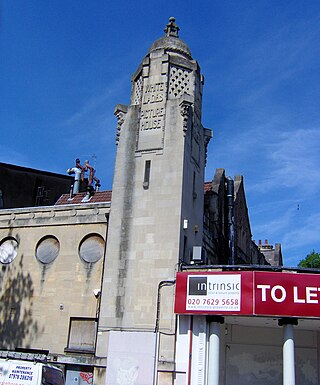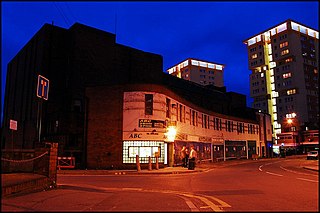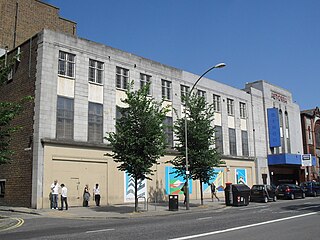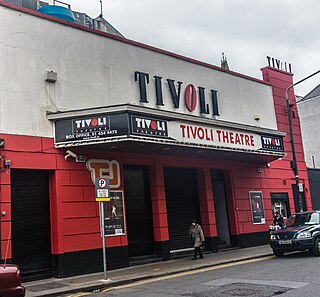
The Odeon Luxe West End is a two-screen cinema on the south side of Leicester Square, London. It has historically been used for smaller film premieres and hosting the annual BFI London Film Festival. The site is on an adjacent side of the square to the much larger flagship Odeon Luxe Leicester Square.

The Rex is a cinema in the town of Berkhamsted, Hertfordshire, England. Designed in the art deco style by David Evelyn Nye in 1936, the cinema opened to the public in 1938. After 50 years of service, the cinema closed in 1988 and became derelict. The building was listed Grade II by English Heritage, and following a campaign to save the Rex by a local entrepreneur, the cinema re-opened to the public in 2004.

Richmond Town Square was a super regional shopping mall known locally as 'Richmond' or 'Richmond Mall', located in Richmond Heights, Ohio, a suburb of Cleveland, at the intersection of Richmond Road and Wilson Mills Road. Opening September 22, 1966 as Richmond Mall, developed by famous mall developer Edward J. DeBartolo Sr. Original anchors were Sears and JCPenney, alongside a Loews Theater and Woolworths. The mall included in-line tenants such as Richman Brothers, and Winkelman's.

Cine City was a cinema in Withington, Manchester, England located at 494 Wilmslow Road, Withington, Manchester, M20 3BG. It opened in 1912 as The Scala, and was the third cinema to open in Britain. When the popularity of picture houses reached its peak in the 1930s, The Scala was one of 109 cinemas in Manchester.

The Whiteladies Picture House is a cinema on Whiteladies Road in Clifton, Bristol, England.

An atmospheric theatre is a type of movie palace design which was popular in the late 1920s. Atmospheric theatres were designed and decorated to evoke the feeling of a particular time and place for patrons, through the use of projectors, architectural elements and ornamentation that evoked a sense of being outdoors. This was intended to make the patron a more active participant in the setting.

The ABC Cinema was a cinema in Wakefield, West Yorkshire that fell into derelition after its closure. Located in Kirkgate on the corner of Sun Lane, it was designed and built in the Art Deco style for Associated British Cinemas by in-house architect William R. Glen and opened as the Regal Cinema on 9 December 1935.
In its days as an entertainment centre for London, Harringay in North London also provided more locally directed entertainment in the shape of four cinemas. The earliest was opened in 1910 and was operating as a cinema until January 2003.

The Warehouse Theatre was a professional producing theatre in the centre of Croydon, England. Based in an oak-beamed Victorian former cement warehouse, it had 100 seats. The theatre closed in 2012 following withdrawal of funding and the discovery, after a survey, of serious faults in the building.

John Stanley Coombe Beard FRIBA, known professionally as J. Stanley Beard, was an English architect known for designing many cinemas in and around London.
Bradford Odeon is the name applied to two different cinemas in central Bradford, West Yorkshire, England. One, in Godwin Street, was built in 1930 and survives; the other, in Manchester Road, was built in 1938 and demolished in 1969.

The Astoria Theatre was a former cinema in Brighton, part of the English coastal city of Brighton and Hove. Built in 1933 in the Art Deco style for a local entertainment magnate who opened one of Brighton's first cinemas many years earlier, it was the first and most important expansion of the Astoria brand outside London. It initially struggled against the town's other "super-cinemas", but enjoyed a period of success in the 1950s and 1960s before rapid decline set in, culminating in its closure in 1977.

Vue West End is a nine-screen cinema complex in Leicester Square, London, operated by Vue Cinemas. The multiplex was constructed in 1993 on the site of what was previously the Warner West End cinema.

The Deco is a restored 1930s cinema and theatre located in the heart of Northampton, England. It is now operated as a venue for corporate, social and theatrical events.

The Everyman Gerrards Cross is a cinema located in Gerrards Cross, Buckinghamshire, England. Originally known as The Playhouse, it has continually served Gerrards Cross as a cinema since it first opened in 1925 and is the oldest cinema in Buckinghamshire. It has been owned by several cinema chains and is currently operated by Everyman Cinemas.

The Mayfair Theatre, also known as the Auditorium Theatre and Auditorium Music Hall, is a historic theatre site in Baltimore, United States. Originally opened in 1880 as a bathing house, the site was later demolished and rebuilt in 1904 as a theatre, which was closed in 1986.

The Tivoli Theatre was a theatre on Francis Street in The Liberties, Dublin which opened in 1934 and operated until 2019 when it was demolished and replaced by "StayCity Aparthotel Tivoli", a 4-star hotel.

The Metro Theater is a defunct movie theater at 2626 Broadway on the Upper West Side of Manhattan in New York City. It was designed by architecture firm Boak and Paris and built between 1932 and 1933. The theater is designed in the Art Deco style and originally contained 550 seats. Although the theater's interior was demolished after it was closed in 2005, the original facade remains intact and is a New York City designated landmark.

The ABC Cinema is a former cinema in Brighton, part of the English seaside city of Brighton and Hove. It also operated under the Cannon and Virgin brands briefly in the 1980s and 1990s. It was built in 1930, initially for Savoy Cinemas; but when that group became part of the new Associated British Cinemas (ABC) circuit later that year, it was redesigned by ABC's own architect William R. Glen and became the group's first major cinema. It was also the second-largest ABC ever built, and the largest cinema in Brighton based on seating capacity. Prominently sited, with a tall, curving entrance façade on East Street in The Lanes and another entrance on the Grand Junction Road facing the seafront and Palace Pier, it was one of Brighton's most important cinemas for much of the 20th century and was chosen as the venue for the world premiere of Brighton Rock in 1948. After closure in January 2000 the building was split up; part is now a casino, another section is a bar, and a restaurant formerly occupied another section. The building is on Brighton and Hove City Council's local list of heritage assets.
















